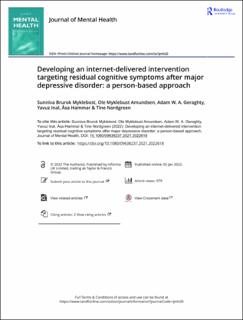| dc.contributor.author | Myklebost, Sunniva Brurok | |
| dc.contributor.author | Amundsen, Ole Myklebust | |
| dc.contributor.author | Geraghty, Adam | |
| dc.contributor.author | Inal, Yavuz | |
| dc.contributor.author | Hammar, Åsa Karin | |
| dc.contributor.author | Nordgreen, Tine | |
| dc.date.accessioned | 2023-01-03T08:15:09Z | |
| dc.date.available | 2023-01-03T08:15:09Z | |
| dc.date.created | 2022-03-15T13:59:57Z | |
| dc.date.issued | 2022 | |
| dc.identifier.issn | 0963-8237 | |
| dc.identifier.uri | https://hdl.handle.net/11250/3040452 | |
| dc.description.abstract | Background
Cognitive difficulties are rarely addressed after the treatment of major depressive disorder (MDD). New scalable treatments are needed. To ensure relevance and engagement of novel interventions, there is a need to understand the perspectives of the users.
Aim
Explore former depressed adults needs and perspectives during the planning and development of a novel internet-delivered intervention targeting residual cognitive symptoms after MDD.
Method
The planning phase included exploratory qualitative interviews with former depressed adults (n = 16). In the development phase, a prototype including psychoeducation, attention training and compensatory strategies was tested in think-aloud interviews with former depressed adults (n = 7) and psychologists (n = 4). Data were analysed thematically.
Results
Analysis of exploratory interviews identified four themes. Experiences of residual cognitive symptoms consisted of two sub-themes (Everyday life is more demanding; Concerns about cognitive difficulties). Coping with residual cognitive symptoms had two sub-themes (Compensatory strategies; Acceptance). Needs from an intervention consisted of two-subthemes (Need for information; Therapist support). Barriers for engagement consisted of three sub-themes (Being overwhelmed; Not being motivated; Frequent registration). Analysis of think-aloud interviews was organized into three themes: Positive perceptions of content; Concerns regarding content; Perceptions of Layout, Visuals and Navigation.
Conclusion
The intervention may address concerns and consequences of cognitive difficulties by including psychoeducation, compensatory strategies and elements to increase acceptance and motivation, provided in manageable proportions. | en_US |
| dc.language.iso | eng | en_US |
| dc.publisher | Taylor and Francis Group | en_US |
| dc.rights | Attribution-NonCommercial-NoDerivatives 4.0 Internasjonal | * |
| dc.rights.uri | http://creativecommons.org/licenses/by-nc-nd/4.0/deed.no | * |
| dc.title | Developing an internet-delivered intervention targeting residual cognitive symptoms after major depressive disorder: a person-based approach | en_US |
| dc.title.alternative | Developing an internet-delivered intervention targeting residual cognitive symptoms after major depressive disorder: a person-based approach | en_US |
| dc.type | Peer reviewed | en_US |
| dc.type | Journal article | en_US |
| dc.description.version | publishedVersion | en_US |
| dc.source.journal | Journal of Mental Health | en_US |
| dc.identifier.doi | 10.1080/09638237.2021.2022618 | |
| dc.identifier.cristin | 2009978 | |
| dc.relation.project | Norges forskningsråd: 259293 | en_US |
| cristin.ispublished | true | |
| cristin.fulltext | original | |
| cristin.qualitycode | 1 | |

